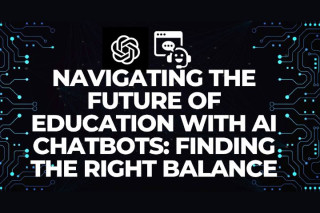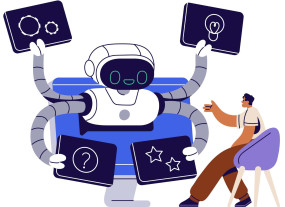- Your School Type
- Solutions
- Resources
- Blog
- Events
- More
- Contact Us
- Book a Demo
- Get a Quote

It is no secret that technology is constantly advancing, and the rise of artificial intelligence (AI) will certainly be a game changer. AI is starting to make its way into all sorts of areas of our lives, and it's interesting to see how it will impact school libraries. One of the most intriguing developments has been the rise of chatbots, like ChatGPT. These computer programs, which are also known as conversational agents, have been designed to have conversations that feel more human-like. They've been making waves across a variety of industries, including education. With the help of AI-powered chatbots, students will be able to interact with information in new ways, which could really change the way we access and share information in the library.
It's interesting to consider the role that AI will play in the education system. While chatbots have the potential to help improve and modernise the education system, they also come with their fair share of challenges. As technology continues to evolve, it's not surprising that many students will turn to these tools to help complete their homework and assignments. Chances are that students are already using these tools right now.
As librarians, it's crucial to stay ahead of the curve and familiarise yourself with these tools. Stephen Taylor's blog "Useme-AI – A Draft Model for Adapting to AI in Schools" raises an important question about the relationship between students and technology in schools. He offers some valuable insights and ideas on how schools can encourage the use of AI, such as promoting understanding of the technology and supporting learning.

It’s our responsibility to teach students how to use these tools responsibly and effectively. This includes teaching them how to evaluate sources, how to use different types of information, and how to interpret what they find. By doing this, we’re not only preparing students for the future, but we’re also ensuring that they have the necessary skills to navigate the vast amount of information that is available to them.
The use of AI tools should not be seen as a replacement for traditional research methods or critical thinking. This blog written by Cherie Shields, stresses the importance of rather than banning tools such as ChatGPT, teachers should embrace it as a tool and provide lessons on how to use it effectively.
While these AI tools can provide a wealth of information, it’s crucial for students to understand the limitations of their sources and be able to distinguish between accurate and inaccurate information. Encouraging students to double check their sources and think critically about the information they receive can help to foster independent and analytical thinkers who are prepared for the future.
I thought it would be interesting to use ChatGPT to ask for a book series recommendation as a small exercise. Below is the question I posed to ChatGPT and its response.
Q: Can you recommend another book series that has a similar style to the Harry Potter series?
A: Sure, here are a few book series recommendations that are similar to the Harry Potter series:
The integration of AI into education can be an incredibly powerful tool, but it’s essential to approach it with caution. By embracing the potential of these tools while still valuing critical thinking and independent research, we can ensure that students are well equipped to succeed in a rapidly changing world.
As new AI tools continue to emerge and rapidly evolve, its potential impacts remain unclear and far-reaching. We're eager to learn more about how school libraries are leveraging or regulating this technology. If you have any insights or experiences to share, we invite you to reach out to us at communications@softlinkint.com. We can't wait to hear from you!